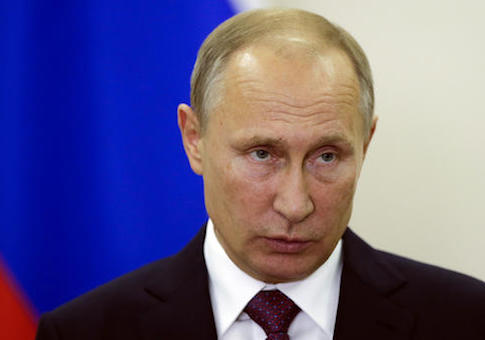The reliance of the United States' critical infrastructure on high technology renders it vulnerable to future cyber attacks by the Russians, making it difficult for the U.S. government to retaliate against Moscow for trying to interfere with the presidential election.
The U.S. intelligence community formally accused Russia earlier this month of hacking into American political organizations, including the Democratic National Committee, in order to influence the 2016 election.
But experts warn that the United States should be wary of starting a "tit-for-tat" cyber war with the Russians, given that the U.S. economy and other critical systems are more dependent on advanced technology and therefore more vulnerable to attack.
"Though we have overwhelming power in this policy area, we are also the most vulnerable nation in terms of the very advancement of the Internet as a part of our society and as a part of our economy," Claude Barfield, a scholar at the American Enterprise Institute with expertise in international trade and cyber security, told a small audience in Washington, D.C., on Friday.
"We are afraid in terms of retaliating against the Russians that we will not be able to have what is called 'escalation dominance,'" Barfield continued. "In other words, you start a tit-for-tat. If the Russians came back at us, and if we went back at them, our economy and society are more vulnerable than the Russians, and the Russians know that."
The issue came to the forefront at a panel discussion on Chinese cyber attacks hosted last week in the nation's capital by the Victims of Communism Memorial Foundation. Moscow and Beijing are both highly capable and advancing in the cyber realm and have hacked into systems used by American companies and organizations, including the government.
"Picture it this way," said Fred Kaplan, author of Dark Territory, a book that explores the history of cyber warfare. "We have much more powerful and agile rocks, but we also live in a house that's made of much more glass, so that even countries with smaller rocks can do more damage to us."
The critical infrastructure of the United States—including its banking and financial systems, transportation, and energy infrastructure—relies on high computer technology networks vulnerable to hacking, Kaplan noted.
"Our entire society is built on this, our economy, our military, everything," Kaplan explained. "One reason why our leaders are a little reluctant to get into the equivalent of a limited nuclear exchange with cyber weapons is that we are really more vulnerable than other countries which are not quite hooked up."
The Department of Homeland Security and the Office of the Director of National Intelligence said on Oct. 7 that the Russian government directed the DNC hack and other compromises of emails used by U.S. citizens and institutions. Representatives of the Russian government, meanwhile, have called the allegations groundless.
The White House has pledged to retaliate against Russia for the hacks with a "proportional response," though it remains unclear what such a response might look like.
"The president has talked before about the significant capabilities that the U.S. government has to both defend our systems in the United States but also carry out offensive operations in other countries," White House Press Secretary Josh Earnest told reporters on Oct. 11. "So there are a range of responses that are available to the president and he will consider a response that is proportional."
Both Russia and China have emerged as strong cyber powers that pose threats to the United States. Russian hackers are believed to be responsible for cyber attacks against the United States that infiltrated computer networks used by the White House, State Department, and Pentagon, as well as hacks of private U.S. entities in recent years.
Evidence also suggests that Russia targeted Ukraine's power grid in December 2015, a cyber attack that caused widespread outages.
"We see a lot of organized criminal behavior coming out of Russia in the cyber realm. But they also have nation-state capabilities. They are probably, next to the United States, the most powerful cyber offensive capability," Rep. Michael McCaul (R., Texas), chairman of the House Committee on Homeland Security, told the Washington Free Beacon in September before Russia was formally implicated in the DNC hacks.
"We see them shut down countries like Estonia, they shut down power in Ukraine. They have meddled in elections in the past. Without getting into all the details, attempts have been made by the Russians in that regard," he said.
China has regularly hacked U.S. companies, and Chinese hackers were responsible for the massive Office of Personnel Management data breach that exposed personal information of 22 million Americans in 2014.
Such attacks have persisted despite cyber pacts between these nations and the United States meant to curb hacking attempts.
The alleged Russian hacks resulted in thousands of embarrassing correspondences between DNC staffers being leaked by WikiLeaks days before the committee's convention in July. WikiLeaks, which has more recently been publishing hacked emails sent and received by John Podesta, Democratic nominee Hillary Clinton's campaign chairman, has denied having connections to Moscow.
Russia's cyber campaign has aggravated an already tumultuous election cycle and fueled speculation about whether the Kremlin is trying to aid Republican nominee Donald Trump, who has made positive statements about Russian President Vladimir Putin. Clinton has referred to the cyber attacks when undermining her opponent as a "puppet" of Russia.
The allegations also further heightened tensions between Washington and Moscow that have run high over the conflict in Syria and Russia's illegal annexation of Ukraine's Crimean Peninsula more than two years ago.
